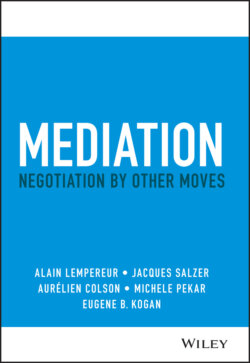Читать книгу Mediation - Alain Lempereur - Страница 66
Control of the Parties Over the Final Decision
ОглавлениеIf one chooses an external decision system – arbitration, ruling, or vote – uncertainty increases as our control over the final decision diminishes. Choosing to rely on a third party is accepting in advance that their decision can disappoint us, not conforming itself to our expectations, hurting us, and even frustrating everyone.
On the other hand, the advantage of mediation – as in negotiation – is to leave the power of the decision to the parties themselves, evidently consistent with public order. In this sense, mediation prolongs the negotiated space where the parties retain their autonomy and engage one another freely. It is only as a last resort, mediation failing, that the final outcome requires an external decision‐making body imposing itself from this point forward. In that respect, mediation makes parties aware of their responsibilities and decision‐making capabilities. They control their decision. Certainly, they can refuse, if necessary, an agreement that they would consider unsatisfying; but the flip side to this freedom is that they can otherwise accept it and agree to implement an agreement that is suitable to them.
Nevertheless, it happens that a party, facing mediation, feels a form of disempowerment. Two principal causes explain how mediation can by perceived as interference. One is the tactlessness of mediators, who fail to act like facilitators when necessary and rather overplay the role of advisers, to the extent of appearing as moralizers and know‐it‐alls. The other reason concerns the inadequate choices of mediators. In Africa, for example, mediations proposed by a former colonial power will in general be badly received by the representatives of an independent state, quick to interpret them as a neocolonial maneuver.
Avoiding this parties' feeling of disempowerment is an ongoing concern for the mediator. Thus, it is up to them to walk the talk and constantly prove by their behaviors and moves that they do the utmost to help the parties to find their own solutions and, in the final analysis, to recall that the ultimate decision belongs to them, and not to the mediator.
*
Committed to overcoming a painful past and building an acceptable future, mediation will be pertinent each time that the relevant conflict will bring together some of the 14 justifications presented in this chapter. There is no need for all criteria to be verified; but the more there are, the more relevant mediation will prove. Needless to say, the fact remains that at the onset of mediation the parties may express fears and doubts. Are mediators neutral? Are they independent enough of all the interested parties? Do they not risk showing themselves more sensitive to the point of view of the other than to mine? Are they competent? Will they keep what I tell them confidential? Are they going to impose their own visions of things on us? Hence the importance, for the mediator, as for the parties, to keep in mind some key principles regarding structuring the functioning of mediation. This is the goal of the following chapter.
